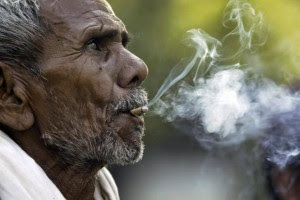
Ohio State could be the first Big Ten school to become a tobacco-free campus, according to Danielle Grospitch, a graduate student in public health. Tobacco-free means no smoking of any kind and no smokeless tobacco.
Grospitch has been spearheading the campaign, Buckeyes Against Butts.
"Our ultimate goal … is to implement a 100 percent tobacco-free campus, which involves indoors, outdoors and any campus-owned property," Grospitch said.
There are 586 colleges and universities in the United States that have enacted smoke-free campuses, according to the American Nonsmokers' Rights Foundation's website. OSU would be the eighth school in Ohio on this list. With this plan, additionally, OSU would not allow chewing tobacco.
The current smoking policy at OSU mimics the state law, which states there will be no smoking indoors or within a 25-foot area around building entrances, exits or windows. There are no regulations regarding smokeless tobacco.
Chris Swonger, a second-year in engineering, thinks the tobacco-free policy would be a good idea if it were enforced.
"I see the (no smoking) signs where there is that overhang at the (Science and Engineering Library) and everyone is just smoking there anyway," Swonger said. "If there were people to enforce it, I think people would listen. But when it's just those signs sitting up and no one comes by to say anything, then who cares?"
For this policy to be adopted, Grospitch and others involved in the campaign plan to conduct research, meet with all departments at the university and draft a policy with implementation and enforcement plans.
"We still need to do a lot of work for this," Grospitch said. "It's still in the very, very, very early stages. Right now, we're just sketching out, in pencil, a plan."
Grospitch thinks OSU could become a tobacco-free campus as early as Autumn Semester 2012.
"It would take at least a year to get that going," Grospitch said. "Knowing Ohio State and knowing how hard policy creation and implementation is for any agency, but alone the size of Ohio State, a year is very fast."
President E. Gordon Gee told The Lantern in April 2010 that he was in favor of eliminating smoking on campus.
"A smoke-free campus is not at the top of my priority list, but if someone came to me with a proposal and we could make that happen quickly, I would be the first in line," Gee said.
Grospitch has decided to "divide and conquer" the efforts to fast-track this project. She is working with Kunal Parikh, a fourth-year in chemical engineering, to help reach out to the undergraduate community.
"What we decided to do is that I will take the section of working with human resources, faculty and staff," Grospitch said. "And (Parikh) will work with students because he is an undergraduate, he has that better pulse on students' wants and needs."
Parikh's interest sparked when he saw a previous article from The Lantern about smoke-free campuses and has been passionate about this effort ever since.
"We pride ourselves as being the greatest university in the nation," Parikh said. "This is obviously a huge factor that Ohio State students are developing healthy habits that they're going to carry for the rest of their lives."
Implementation cost is not yet known but Parikh said it's insignificant compared to what OSU will save.
"The other way to look at this is productivity in the workplace and healthcare costs, the cost of implementing this program is really negligible compared to that," Parikh said.
Swonger thinks OSU will benefit from the switch to be tobacco-free but smokers will likely suffer.
"I think it's a good idea to help keep campus cleaner but, personally, if I was a smoker, I probably would be irritated," Swonger said. "Especially with how large campus is, there's a good chance you'd have to walk quite a bit to get off campus to smoke."
With the deadly consequences of tobacco use and second-hand smoke widely known, Grospitch stressed the importance of this policy for the environment.
"It takes a major toll on the environment when people litter tobacco products," Grospitch said. "Cigarette butts take several years to disintegrate and they still carry 69 carcinogens that soak into our soil which soaks into our water which then we drink."
OSU could be the leader in the effort to have a tobacco-free campus in the Big Ten, Grospitch said.
"The fact that Ohio State could wear that badge of honor, I think would be awesome," Grospitch said. "We could say, ‘We care about each other. We care about our school. We care about our environment.'"








